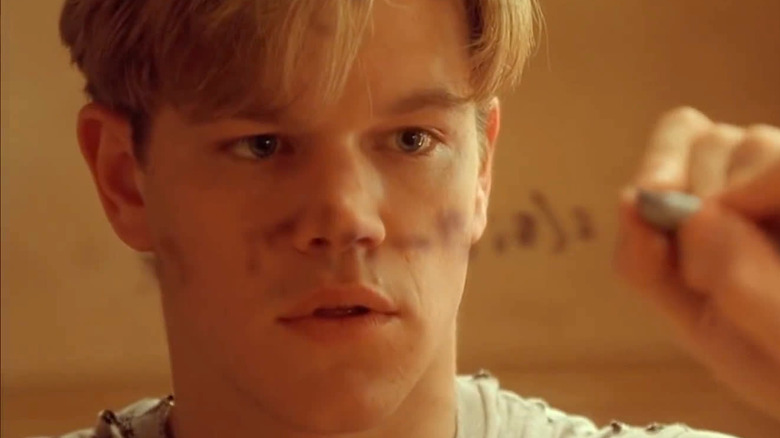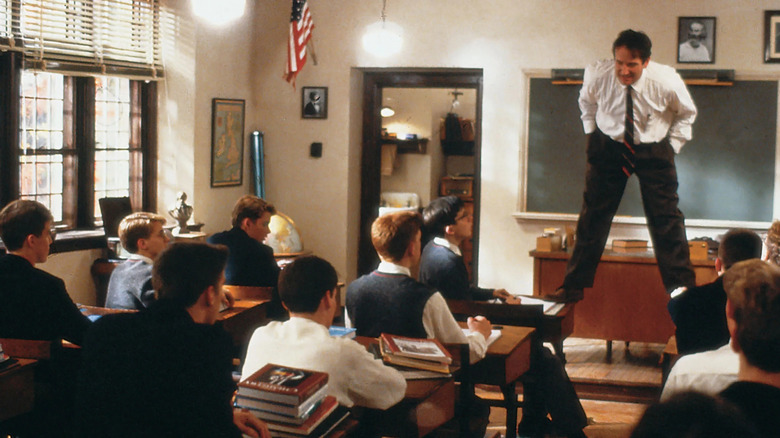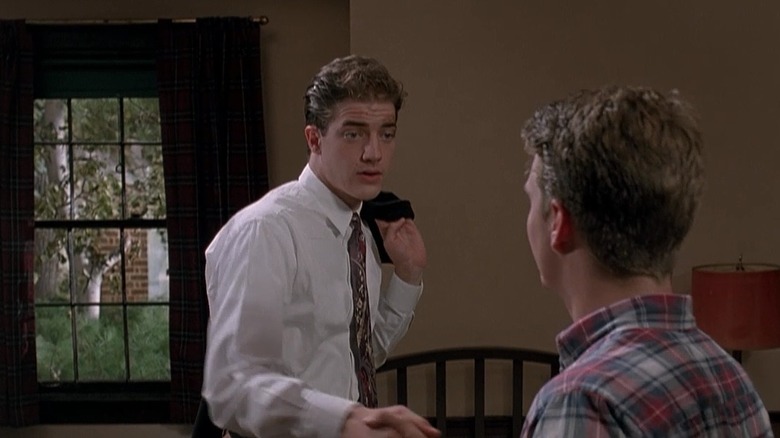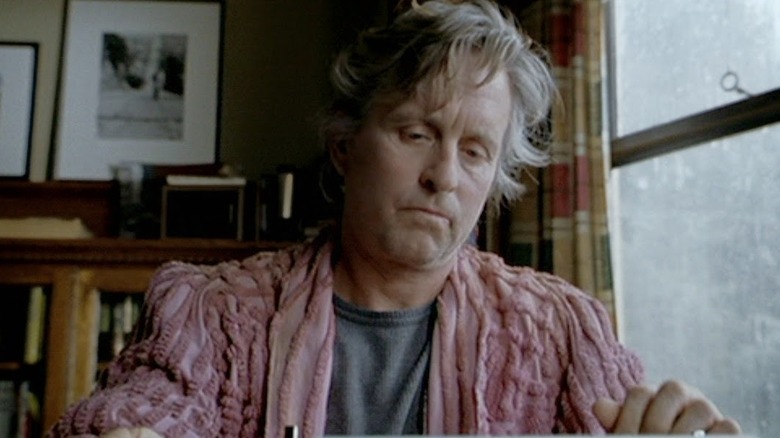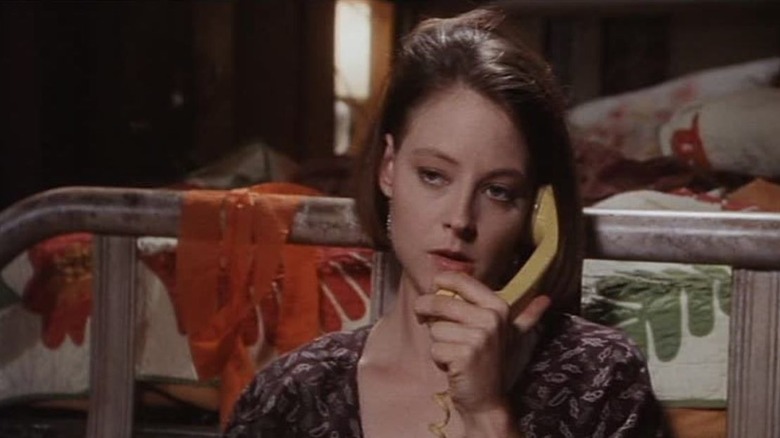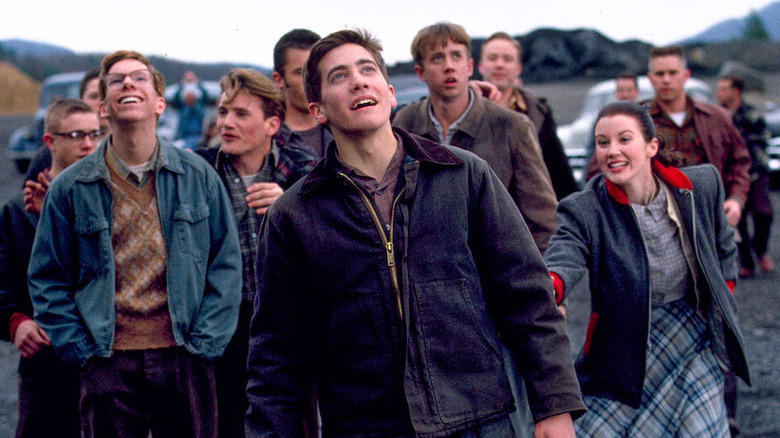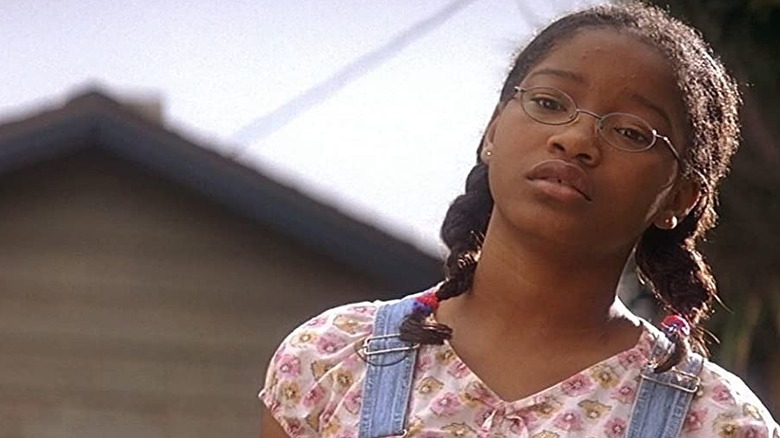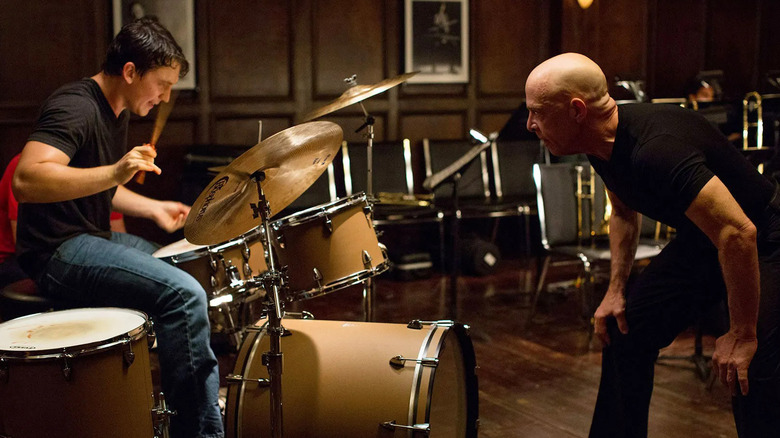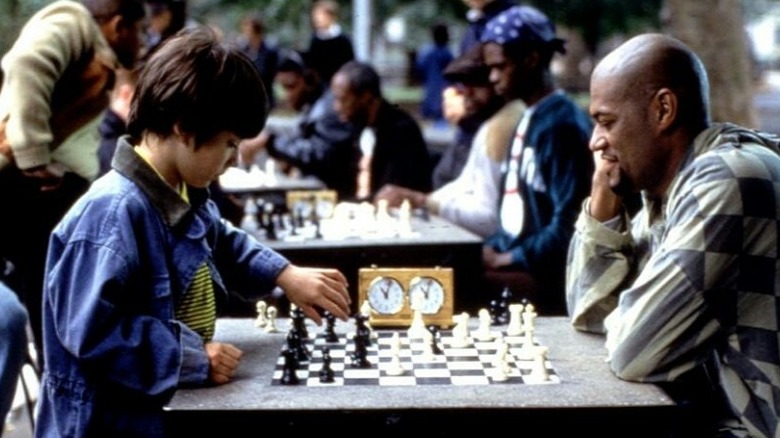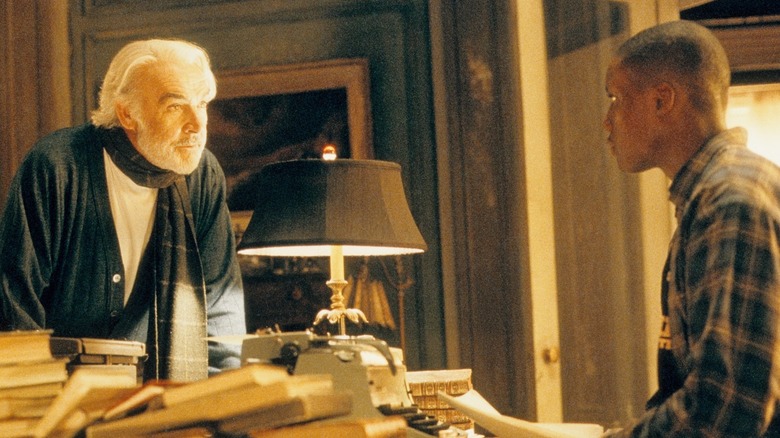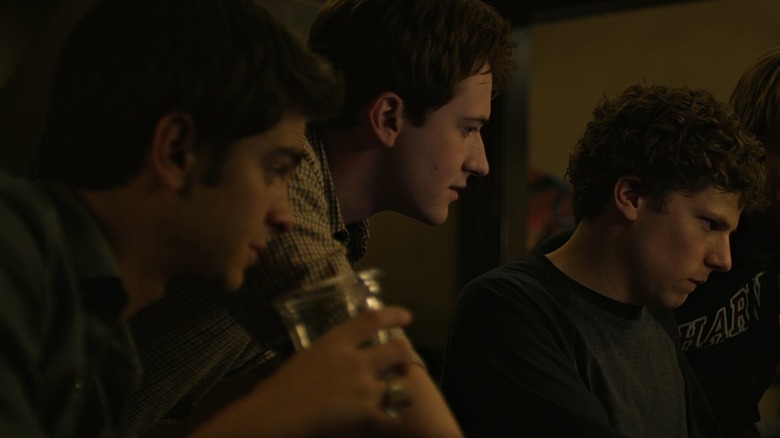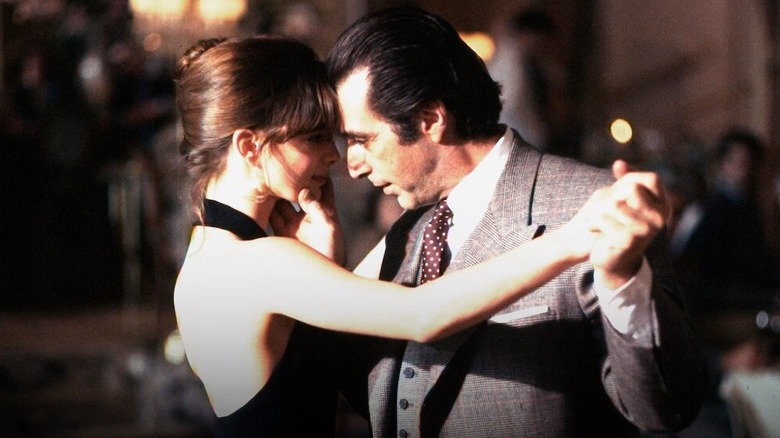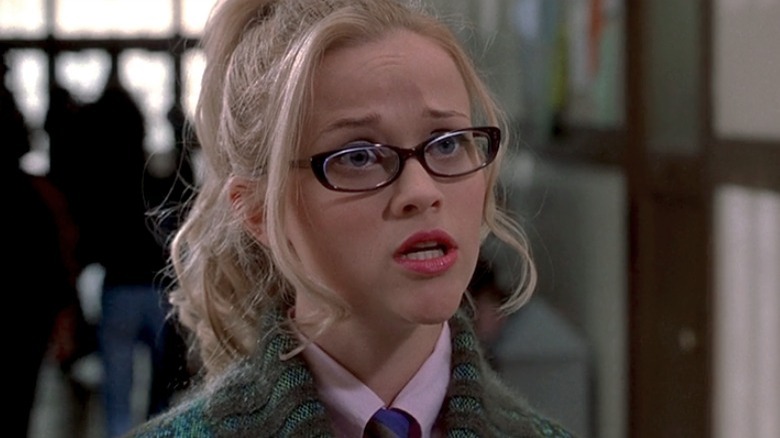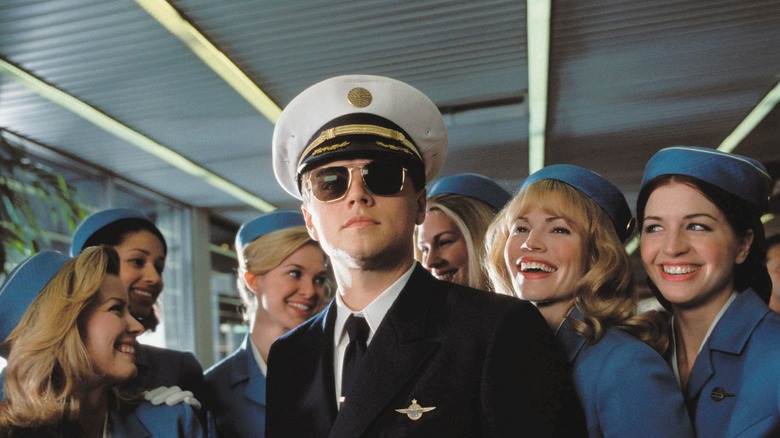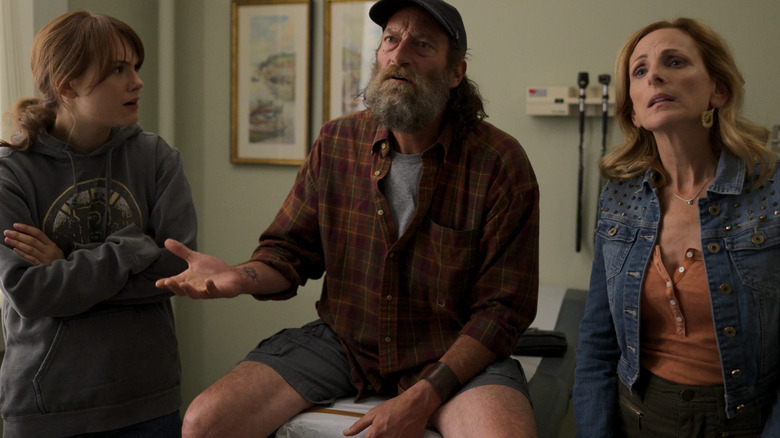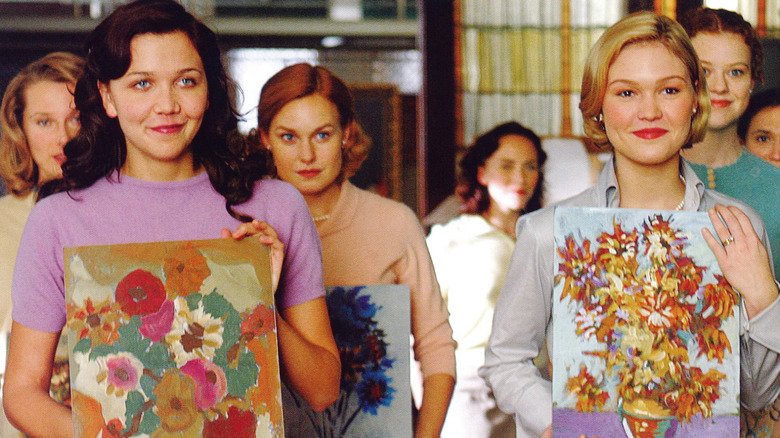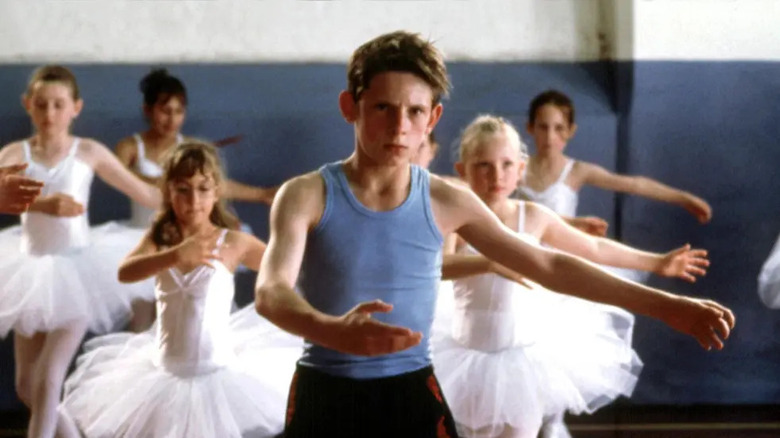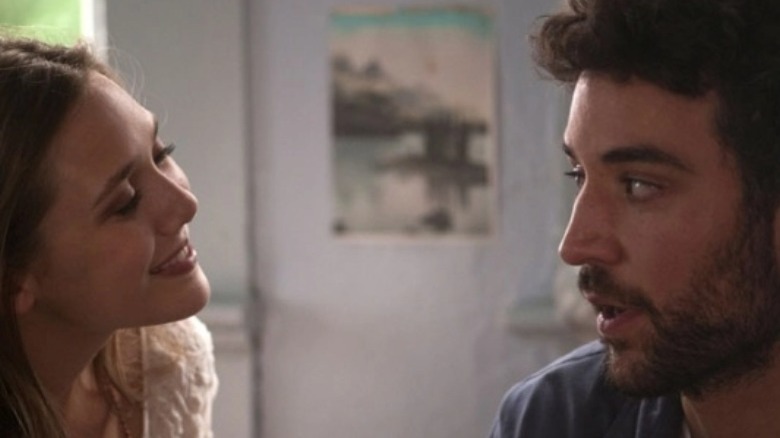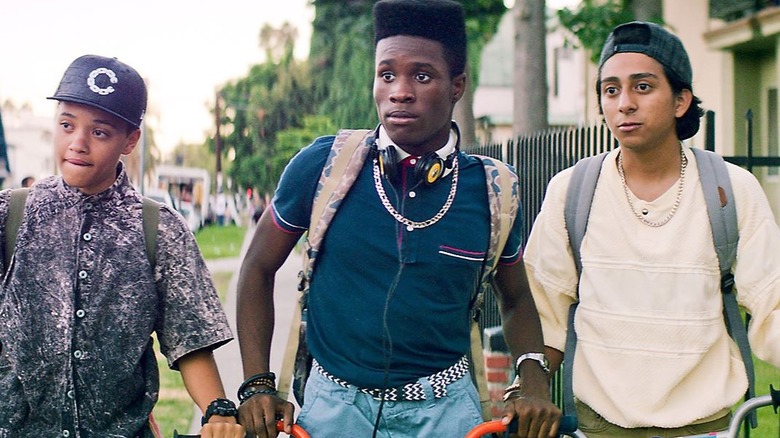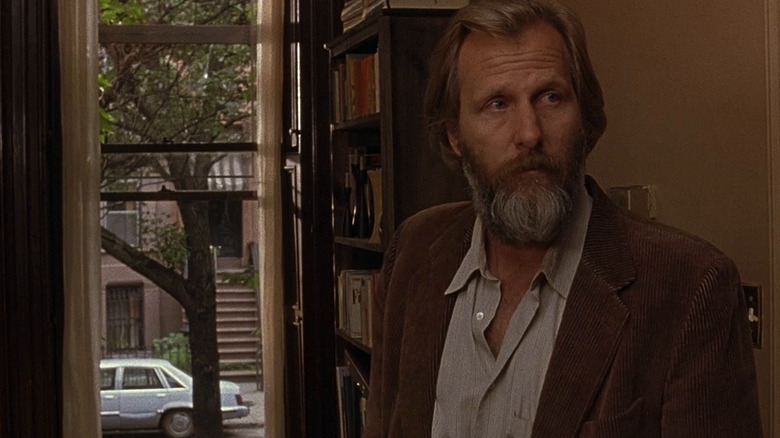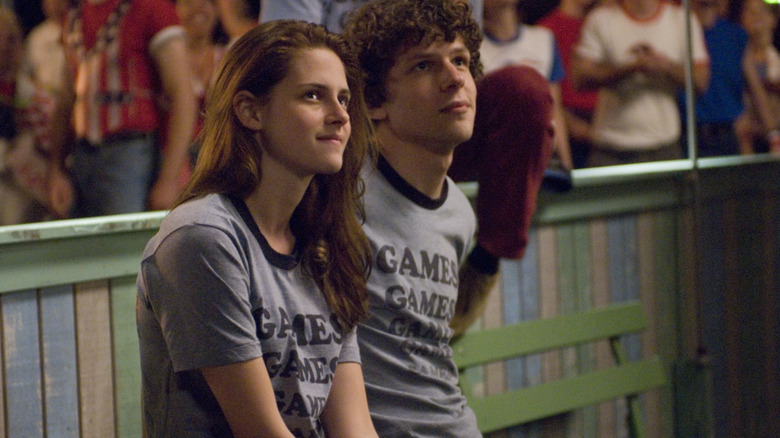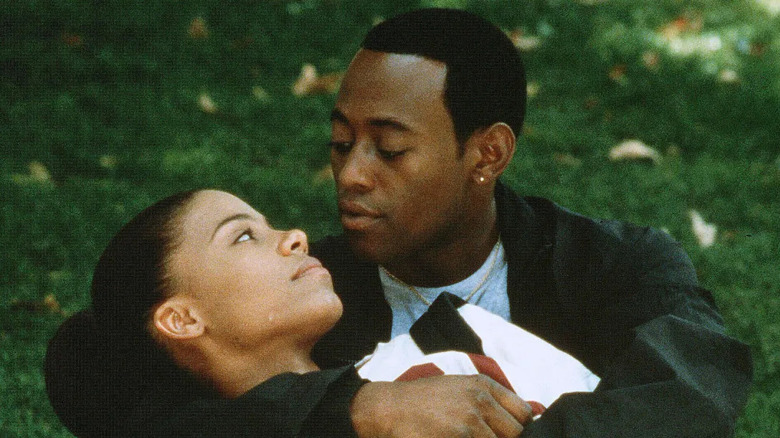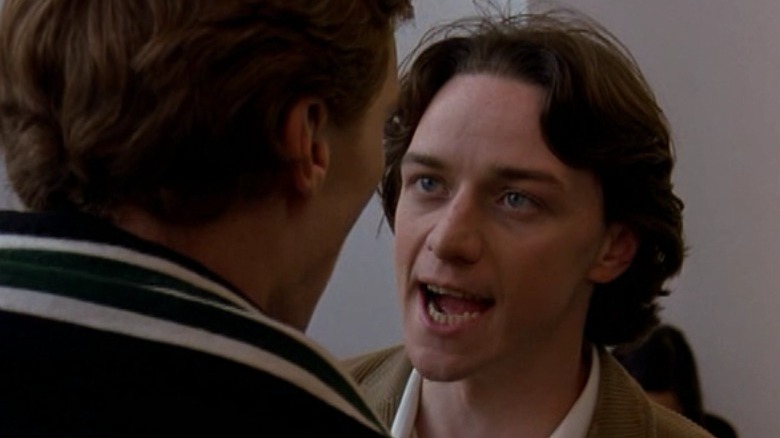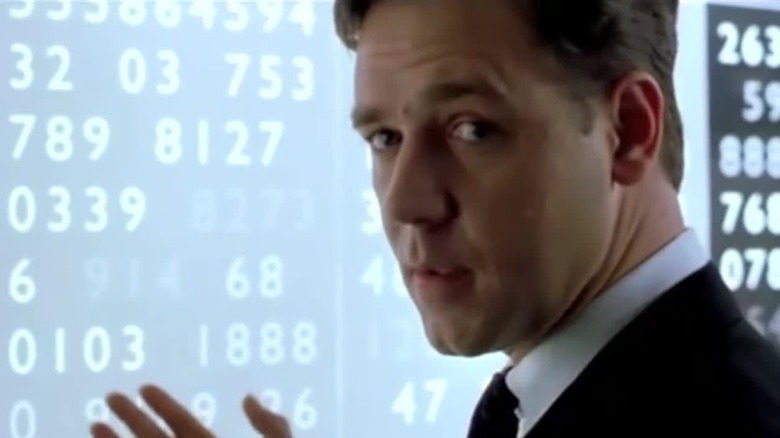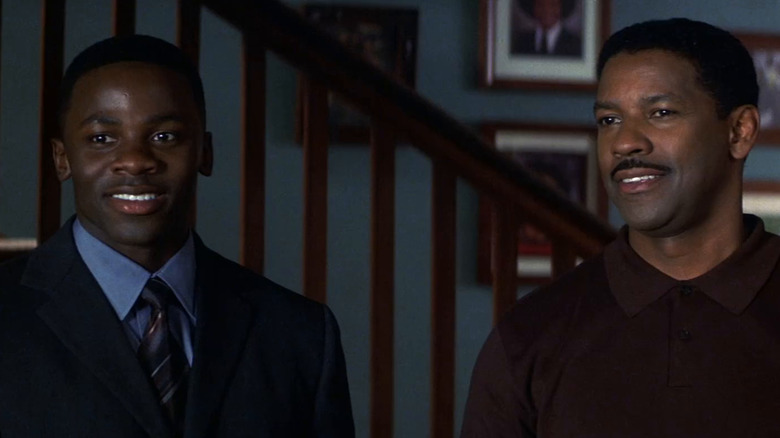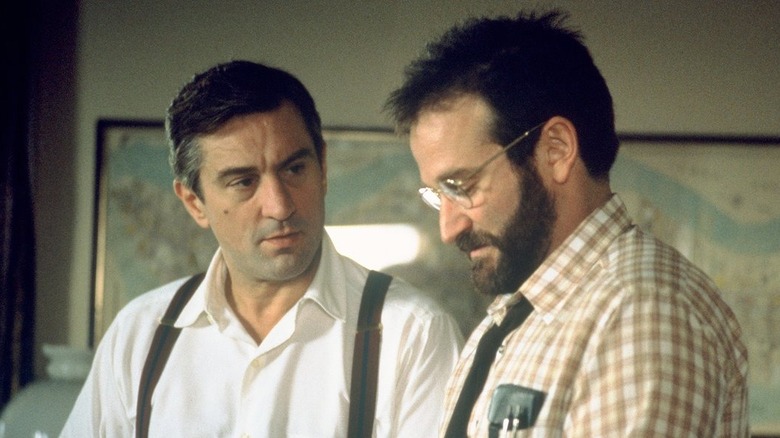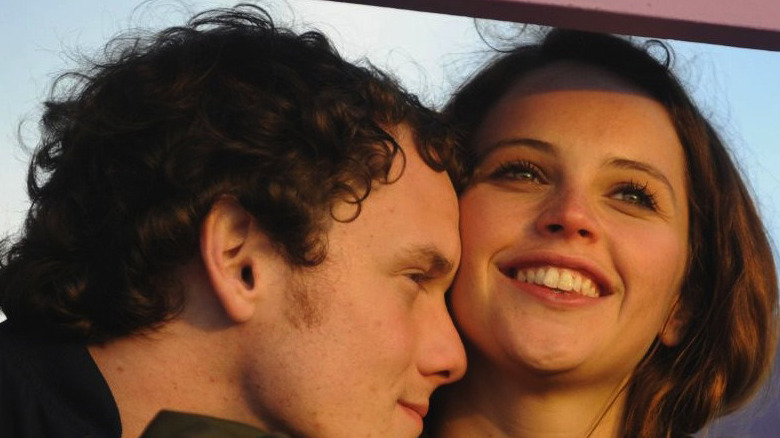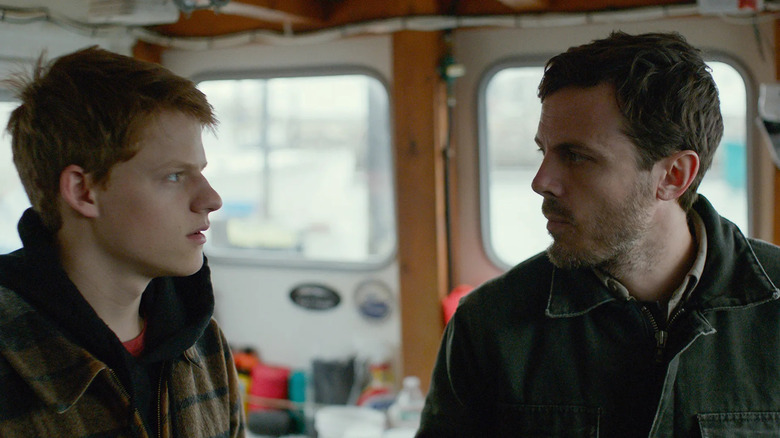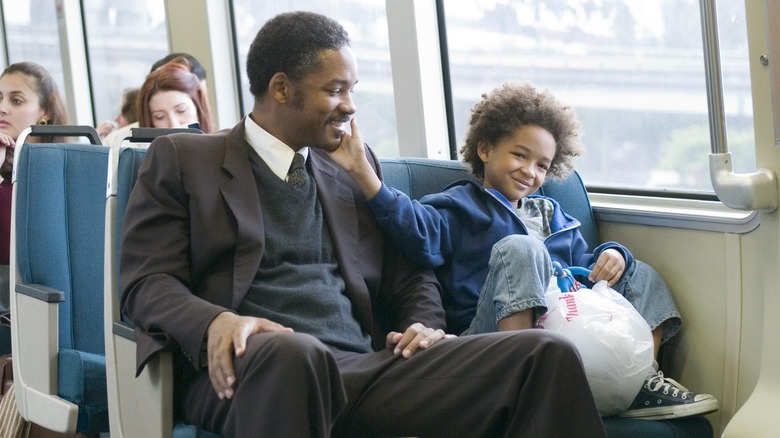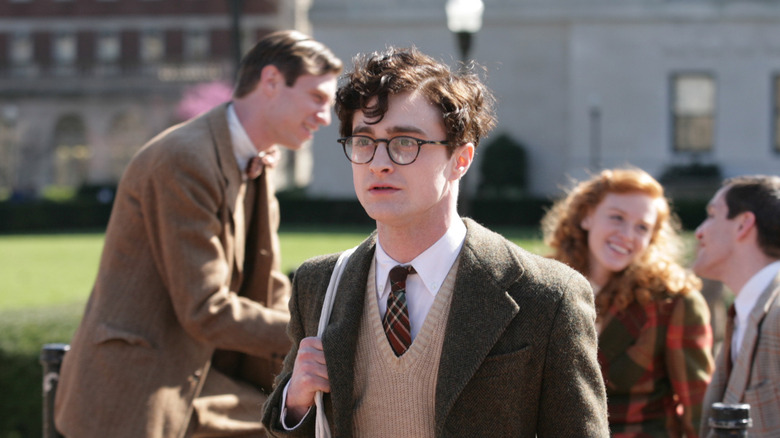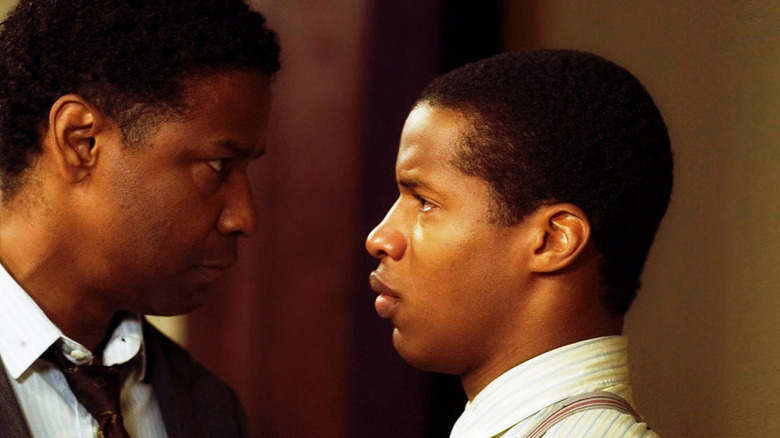30 Great Movies Like Good Will Hunting You Need To See Now
"Good Will Hunting" is the kind of movie that rarely gets made anymore. In an oral history, Boston Magazine recounts the 1997 drama's unimaginable success, noting that the film was produced for $10 million but collected more than $225 million at the box office. It received near-unanimous praise from critics and won its fair share of awards, including a best original screenplay Oscar for first-time writers Matt Damon and Ben Affleck, as well as a best supporting actor trophy for costar Robin Williams. The film launched the careers of Damon and Affleck, who remain some of the most viable players in the industry today, and it elevated Williams to legend status.
Damon's Will Hunting is an untapped genius living in poverty with serious anger issues. He's on-shift as a janitor when he solves a seemingly impossible problem left on the board by an MIT professor. This show of intelligence presents new opportunities for Will, but ascending to a better life isn't so easy as coming up with the answer to an equation. With the help of a court-assigned therapist, Will confronts his painful past and the class distinctions that have been a thorn in his and his city's side.
The film didn't create the formula, but "Good Will Hunting" is perhaps the most well-known example of a mentor/mentee story exploring various pressing social topics. While personal, original stories like "Good Will Hunting" are increasingly rare in Hollywood, there are some excellent examples out there waiting to be discovered. These 30 movies rival "Good Will Hunting" in quality, style, subject matter, tone, and themes.
Dead Poets Society
This 1989 film has much in common with "Good Will Hunting," right down to its New England school setting, its equally moving performance by Robin Williams, and its identical critical and commercial response. It, too, impressed critics and garnered multiple awards nominations while making more than $200 million off of its $16 million budget on its way to becoming a thinking person's classic.
"Dead Poets Society" takes place in 1959 in a fictional all-boys boarding school, Welton Academy, where the new English teacher John Keating (Williams) uses unorthodox methods to inspire his uptight students. The boys discover that Keating also attended Welton and was a member of a secret organization known as the Dead Poets Society. They reestablish the unsanctioned club and begin to find themselves through writing and theatre, much to the dismay of the strict headmaster and their parents who intend for them to be accepted into competitive colleges and follow professional career paths. When the students' personal ambitions and political opinions venture too far out of bounds, the status quo is threatened with potentially devastating consequences.
School Ties
1992's "School Ties" also features Matt Damon and Ben Affleck (as well as Chris O'Donnell and Anthony Rapp), but it puts Brendan Fraser in the pivotal lead role. Fraser plays David Greene, an exceptional scholar and football player who is sent to an elite prep school on scholarship in 1955. At first, the handsome and winning Greene is easily accepted into the school's social circle. The guys want to be him, and the girls want to be with him. However, he discovers that antisemitism runs deep among his peers, and so he decides to hide the fact that he's Jewish. When his heritage is found out, jealousy and bigotry rear their ugly heads.
"School Ties" shines a light on the personal and systemic prejudices that some students face while illustrating how their more affluent, privileged cohorts often don't expect to deal with repercussions. The film wasn't a hit on the same level as "Good Will Hunting," but Entertainment Weekly notes that it introduced the world to a new generation of actors who would go on to become marquee names.
Wonder Boys
"Wonder Boys" is another academia-set story that examines personal conflict through the conceit of literature. The 2000 dramedy based on Michael Chabon's novel of the same name, starring Michael Douglas, Robert Downey Jr., Katie Holmes, and Tobey Maguire wasn't exactly a financial success, but it did win over critics and managed to get nominated for three Academy Awards.
Douglas is Grady Tripp, a celebrated author and creative writing professor who can't bring himself to finish his second book — a problem that will plague more characters on this list. His editor is breathing down his neck, his third wife has just left him, and he's busy mentoring two promising but needy students. Grady copes by smoking pot and largely ignoring his problems until he learns that the woman he's been having an affair (who also happens to be his boss' wife) is pregnant. "Wonder Boys" is decidedly less stuffy than its various elements make it sound, and it is ultimately a relatable parable about the need to make choices amid challenging circumstances.
Little Man Tate
This 1991 movie marked the directorial debut of Jodie Foster and was a sleeper-hit success that was well-liked by critics and audiences. Dede Tate (Foster) is a waitress and single mom at a loss for how to raise her son, Fred. He's clearly brilliant beyond reason — he understands quantum physics at seven and can play the piano without ever having been taught –- but he lacks social and emotional gifts and doesn't fit in with other kids his age. This fact becomes painfully obvious to his mom when none of classmates show up to his birthday party.
Dede wants as normal an upbringing as is possible for Fred, but she eventually relents and allows him to attend a school for the gifted, where a professor assures her the boy will thrive. Enrolling in the school doesn't "fix" Fred, however. "Little Man Tate" never discusses autism spectrum disorder explicitly, but Huff Post observes that the film heavily implies that Fred and the other gifted students exhibit characteristics of ASD. The film is slightly dated in its reliance on what are now considered autism stereotypes, but on the whole, it's a warm and realistic early depiction of parenting a neuro-atypical child.
October Sky
"October Sky" is a biopic about NASA engineer Homer H. Hickam Jr., based on his memoir, which was initially titled "Rocket Boys" (of which "October Sky" is an anagram). The 1999 drama did well at the box office and even better with critics, and remains beloved today, thanks to a stellar cast that includes Chris Cooper, Laura Dern, and Jake Gyllenhaal in his breakout role.
Homer is the son of a West Virginia coal miner and seems destined for the same harsh life until the flight of Sputnik 1 catches his attention. He and his friends devote themselves to building rockets and begin to imagine themselves winning a science fair and maybe even scholarships, but they're thwarted by fate, the expectations of their fathers, and the need for steady work that provides a reliable income. "October Sky" deals with many of the same socio-economic and psychological issues as "Good Will Hunting" but adds labor relations and international affairs to the mix.
Akeelah and the Bee
This 2006 inspirational film was the recipient of the Nicholl Fellowship for Screenwriting and was honored by the NAACP and Black Reel for its depiction of its Black protagonist. "Akeelah and the Bee" was written and directed by Doug Atchison and stars a young Keke Palmer as the title character.
11-year-old Akeelah lives and goes to school in a predominantly Black area of South Los Angeles. She's smart but prone to skipping school, which compels her principal to insist she participate in the spelling bee or risk punishment for her truancy. At first, Akeelah is rude to her teachers and disinterested in training to win the competition, but she comes to want the chance to represent Crenshaw Middle School at the National Spelling Bee. Her journey from a promising good speller to a prospective champion is full of ups and downs. Along the way, viewers get a telling glimpse into the tension between affluent and disadvantaged participants at such events.
Whiplash
"Whiplash" began life as Damien Chazelle's acclaimed short film, per StudioBinder. The auteur behind "La La Land" and "First Man" expanded that short into a feature starring Miles Teller and J.K. Simmons. It became an instant hit, winning multiple prizes at 2014's Sundance Film Festival and racking up nominations and awards elsewhere including a best supporting actor Oscar for Simmons.
Teller is Andrew Neiman, a jazz drummer studying at a prestigious conservatory under an exacting teacher named Terence Fletcher (Simmons). Playing professionally at a high level is Andrew's dream, but his dynamic with his mentor is toxic. The frequency and intensity with which Andrew must practice strains on his other relationships and his mental health, and he isn't the first of Fletcher's students for whom this has been the case. Circumstances eventually pit Andrew and Fletcher against each other, though they still recognize that they need each other. "Whiplash" questions the extent to which great artists sacrifice for their art all while telling a personal story that's as gripping as anything in "Good Will Hunting."
Searching for Bobby Fischer
If stories about child prodigies are their own genre, there's a subgenre about kids who play chess. 1993's "Searching for Bobby Fischer," starring Ben Kingsley and Laurence Fishburne, is an excellent example of this.
Seven-year-old Josh is fascinated by the men who play chess at the park. At first, his parents discourage the obsession, but when they come to understand he has real talent, they get him a proper tutor named Bruce (Kingsley) and begin to enroll him in tournaments. However, Josh enjoys sitting across the table from Vinnie (Fishburne), one of the men from the park, and he prefers his more daring style of play.
What follows is a tale of multiple conflicts of interest. Josh's parents put too much pressure on their young son to win high-stakes competitions, which causes him to struggle at chess and life in general. Meanwhile, his two rival influences pull him in opposite strategic directions. Everything comes to a head at the National Chess Championships when Josh faces off against another prodigy.
Finding Forrester
"Good Will Hunting" director Gus Van Sant also helms this film about a Black student from the Bronx who is invited to attend a selective private school in Manhattan after showing great potential in the classroom and on the basketball court.
"Finding Forrester" stars Sean Connery as the titular character and Rob Brown as the protagonist, Jamal, and even features Matt Damon in a smaller role. William Forrester is an elderly reclusive writer, which Deadline notes is loosely based on J.D. Salinger, who spies on the local kids through his window but never leaves his apartment. When Jamal's friends dare him to break into the mysterious man's apartment, the boy inadvertently makes Forrester's acquaintance.
The once-lauded author who never followed up his masterpiece agrees to help the aspiring writer edit his work as long as he keeps their budding friendship private. While both parties get something they'd been missing out of their bond, Jamal's improvement as a writer gets him suspected of plagiarism and puts his scholarship at risk. "Finding Forrester" tackles racism as well as post-traumatic stress disorder without being too didactic or feel-good.
The Social Network
If "Good Will Hunting" is a bittersweet and inspiring story about a brilliant dropout, "The Social Network" is a cerebral and terrifying one about the same type of character. The 2010 film, directed by David Fincher with a script by Aaron Sorkin, tells the semi-true story of Mark Zuckerberg and the founding of Facebook. Despite what could have been dry subject matter, Quentin Tarantino told Premiere that he felt "The Social Network" was one of the best films of the new century, and it only becomes more prescient with age (via The Guardian).
Jesse Eisenberg plays Zuckerberg as a malcontent Harvard student who strikes out with girls and creates a prototype of Facebook as a way to get revenge on someone who broke up with him. The college board puts him on probation, but he and some of his fellow students, namely the Winklevoss twins and Eduardo Saverin, develop the idea further. However, once the site takes off and becomes profitable, who is responsible for what morphs into an ugly legal battle that demonstrates how morally pliable the social network's founder really is.
"The Social Network" famously lost out to "The King's Speech" for best picture. Still, it endures in the culture thanks to Sorkin's firecracker script, Trent Reznor and Atticus Ross' memorable score, and standout performances by Eisenberg, Andrew Garfield, and Justin Timberlake.
Scent of a Woman
This 1992 remake of an Italian film is probably best known for Al Pacino's iconic Oscar-winning performance as Lieutenant Colonel Frank Slade (Hoo-ah!). However, the real legacy of "Scent of a Woman" is that it practically created the model for many movies on this list in which two characters, mismatched in age, resources, and temperament, teach each other something vitally important about life. In fact, Matt Damon told Vanity Fair that he auditioned to play the lead role of Charlie Simms, although the part went to Chris O'Donnell.
Charlie is a New England prep school student on scholarship and so short on cash compared to his affluent classmates that he has to take a temp job to afford a plane ticket home. To complicate matters, his headmaster has bribed him with a letter of recommendation for Harvard if he snitches on some pranksters.
The gig is caring for Slade, a blind veteran, and the experience turns out to be more frustrating and rewarding than Charlie could've imagined. Slade is an alcoholic prone to emotional extremes, and he insists Charlie accompany him on an impromptu trip to New York City. When it becomes apparent that his charge's zest for life is fading, Charlie helps him rediscover his courage. For his part, Slade encourages his too-timid caretaker to embrace risk and imperfection, culminating with an iconic tango and courtroom speech.
Legally Blonde
In some ways, 2001's "Legally Blonde" and "Good Will Hunting" seem like polar opposites. One is a bubble gum-colored broad comedy about a rich girl from California with a perma-smile and a chihuahua. The other is a muted drama about a kid from the wrong side of the tracks with a sad backstory and a bad attitude. However, while they're completely different in tone, they share several plot elements and the same basic message.
A sorority girl about to graduate, Elle, follows her preppy ex-boyfriend to Harvard Law when he dumps her for not being the right kind of partner for an aspiring politician. Her GPA is as high as her designer heels, so getting into Harvard isn't a big deal. The problem is being taken seriously without compromising who she is.
Like Will Hunting, Elle Woods also has to contend with a problematic mentor and a messy romantic situation. The heart of both movies is the unexpected friendship that develops between the young protagonists and their wise but wounded older companions. Both films are as much about the need to respect everyone's intelligence as they are about balancing your ambitions with your personal life. "Legally Blonde" was popular enough to generate a film franchise, including a long-promised third installment and a Broadway musical.
Catch Me If You Can
Even though"Catch Me If You Can" made nearly seven times its budget at the box office, earned two Academy Award nominations, and stars Tom Hanks opposite Leonardo DiCaprio, it's still one of Steven Spielberg's most underrated movies. This mostly true crime story proves that sometimes real life is stranger — and more entertaining — than fiction.
DiCaprio is Frank Abignale Jr., a smart and generally happy teenager whose future becomes wildly uncertain when financial and marital trouble brew at home. One lie begets many more as a desperate but savvy Frank strives for the kind of idealized American life he thought he had before. He goes from high school student to one of the world's most successful con men, impersonating everything from a teacher to a pilot to a doctor. Hanks' FBI agent Carl Hanratty is following his paper trail but is often outwitted and embarrassed by the young Frank.
Though they find themselves in an adversarial situation, Carl and Frank realize they understand and maybe even need each other. "Catch Me If You Can" is as stylish as it is gut-wrenching. It nails its mid-century aesthetic and its cat-and-mouse caper tone, and it leaves viewers alternating between chuckles and tears.
CODA
"CODA" was 2021's little movie that could — much like Good Will Hunting was in 1997. The film, which premiered at the 2021 Sundance Film Festival and was purchased by Apple TV+, has slowly been picking up steam with critics and audiences since it began streaming and managed to position itself to contend for best picture at the 2022 Oscars, as noted by Vanity Fair.
The film, which Slate notes is a remake of a French movie, tells the story of Ruby, the only hearing person in her family of four. Ironically, Ruby longs to be a singer and has a chance to make her dreams come true when an encouraging music teacher intervenes to develop her talent and help her apply to college. Sweetening the pot is the fact that she's assigned a duet with her crush, who is auditioning for the same school. However, making it to that school would mean leaving her family (and, just as importantly, their struggling commercial fishing business) without an interpreter.
"CODA" is heartfelt but down-to-earth and humanizes the deaf community to an extent that's long overdue. Troy Kotsur's supporting performance as Ruby's father is reason enough to watch.
Mona Lisa Smile
It's time to revisit and reevaluate 2006's "Mona Lisa Smile." The film is reminiscent of several other titles on this list but performed worse with critics and audiences, with the most obvious difference being its nearly all-female cast. In retrospect, what an incredible cast it is!
Julia Roberts is Ann Watson, an unmarried grad student who takes a position at Wellesley teaching art history to a bunch of preppy prima donnas played by Kirsten Dunst, Maggie Gyllenhaal, Julia Stiles, and Ginnifer Goodwin. Though the girls are clearly capable of having careers of their own, most of them skew conservative and have resigned themselves to marrying well and fulfilling their duties at home. Ann doesn't attempt to change their minds per se, but she uses her eccentric opinions about art and culture to inspire them to go after whatever it is they want in life, whether that's a law degree or a different husband than their parents want for them.
"Mona Lisa Smile" isn't exactly subtle in its conclusions about feminism (or at least the white, upper-class feminism of the 1950s). Still, it's a well-made reminder that such limitations on the roles of women in society aren't remotely ancient history.
Billy Elliot
Another film about the son of a coal miner who longs for something more out of life, "Billy Elliot" leapt and twirled its way to the top of the box office charts and several BAFTAs and Academy Awards nominations in 2000. Based on a play called "Dancer," this coming-of-age story follows 11-year-old Billy, played by Jamie Bell in his breakout performance.
Billy's father wants to toughen him up with boxing lessons, but Billy is disinterested in fighting and enrolls in ballet class at the gym instead. His teacher recognizes that he's a unique talent, but his father -– who's dealing with a strike and a live-in mother-in-law with dementia –- disapproves.
While the ultimate resolution of the plot might be predictable, the way "Billy Elliot" plays out from moment to moment is surprising and delightful. The film features a subplot about LGBTQ youth that's handled well both for the year in which it takes place and its release date. The film was such a sensation it circled back to live theatre and was reinterpreted into an award-winning stage musical in 2005 that ran for more than a decade, per Broadway.com.
Liberal Arts
This little-seen movie about the transition from college to the real world is, in some respects, the same story as many other films on this list told in reverse. Josh Radner is the writer, director, and star of "Liberal Arts" as Jesse Fisher, a 35-year-old who works at a New York City college. Jesse is frustrated with the drudgery of adulthood. Neither his professional life nor his love life has lived up to his expectations. So, when an old professor at his alma mater (Richard Jenkins) invites Jesse to his retirement, he sets off to relive his happy university days, if only for a while.
In the midst of his nostalgia trip, he becomes involved with a 19-year-old student (Elizabeth Olsen) and a former favorite teacher many years his senior (Allison Janney). He also comes to realize that the bookish teens and the elbow-patched academics –- both of whom he's idealized and envied -– are just as unsure of themselves and their life-altering decisions as he is.
Dope
"Dope" was written and directed by Rick Famuyiwa, whose career has seen him helm everything from feature films to episodes of "The Mandalorian." This vibrant, genre-mashing Sundance Film Festival entrant offers an entirely new take on the poor-kid-goes-to-Harvard trope.
Malcolm and his friends are Black nerds living in Inglewood, California, frequently encountering gang members they don't really want to associate with. Malcolm is confident he's destined for the Ivy League, and his guidance counselor has arranged for him to be interviewed by a local alumnus whose recommendation would help him on his way. However, being in the wrong place at the wrong time jeopardizes his future.
He attends a party where a drug deal goes wrong and ends up with the evidence stashed in his backpack. Malcolm must use his book smarts and street smarts to infiltrate his neighborhood's underworld and upper class, all while helping the girl he likes to study for the GED. "Dope" is full of earned plot twists and has the distinction of being one of the first feature films about bitcoin and the first one to accept payment for tickets in the currency, according to The Wrap.
The Squid and the Whale
Noah Baumbach's strangely named, semi-autobiographical drama earned him a reputation in 2005 as an indie auteur on the rise. Jeff Daniels and Laura Linney play Bernard and Joan Berkman, two married writers living in 1980s Brooklyn. Bernard's career and mental health are in a downward spiral (you guessed it; he has writer's block), while Joan's prospects are looking better than ever. Their marriage is falling apart under the strains of professional jealousy, infidelity, and the stress of raising two boys.
Their older son, Walt (Jesse Eisenberg), is sympathetic to his father, while the younger one, Frank (Owen Kline), identifies more with his mother. When the boys begin to display worrisome behaviors, it becomes clear that — regardless of whether the couple stays together or apart — the damage has already been done, and help in the form of therapy will be necessary. "The Squid and the Whale" is a self-aware reflection of inherited trauma with a crackling script.
Adventureland
"Adventureland" is as much a vibe as it is a movie, in the best way possible. Jesse Eisenberg stars here, too, as James Brennan, an uptight recent college grad who'd anticipated summering in Europe before starting grad school at Columbia in the fall, in hopes of becoming a respected journalist. When it turns out that his parents can no longer bankroll his lifestyle, his plans fall through and he's forced to take a job at a kitschy Pennsylvania amusement park since no one else would hire him based on his lack of actual work experience.
The 1980s-set comedy, which The Wall Steet Journal notes was filmed at the historic Kennywood theme park, also stars Kristen Stewart, Ryan Reynolds, Bill Hader, and Kristen Wiig as some of Adventureland's ragtag crew of employees. During his months spent manning the carnival games, James makes friends, enemies, and lovers. More importantly, he comes to understand daily life outside of academia with a level of intimacy he'd never have experienced otherwise. That, combined with his roommate's change of heart, makes him question his haughty aspirations and his narrow-minded sense of self-worth, a journey of self-discovery that has parallels to Will Hunting's.
Love & Basketball
Gina Prince-Bythewood's debut film was appreciated by audiences and critics upon its release in 2000, and 20 years later ESPN still remembers it as a classic. "Love & Basketball" combines a rousing sports story with a charged romance and underlines it all with the socioeconomic and cultural issues that faced Black female student-athletes in 1980s Los Angeles.
Monica and Quincy are childhood friends and basketball phenoms who both dream of careers as professional athletes. Quincy's dad plays for the Clippers, and since he's a young man in a sport in which men's leagues bring in more attention and money, he has an easier time making a name for himself. Monica has as much (if not more) raw talent but has less of a head start and gets far less support and positive feedback.
"Love & Basketball" charts Monica and Quincy on and off the court over the years as they fall in and out of love with each other and their chosen sport. It soulfully meditates on the true costs women pay when they make all-consuming commitments, whether they be to one's passions or one's people.
Starter for 10
This British import, written by David Nicholls and based on his book of the same name, is another scholarly dramedy about a brilliant working-class kid at an elite college set in the 1980s. This time, James McAvoy stars as Brian Jackson, a first-year Bristol student prone to depression whose longtime ambition has been to compete on a game show called University Challenge. He tries out for Bristol's team, but, despite his trivia prowess, he ends up left off the roster by a spot when he helps a girl named Alice with her answers.
In the meantime, Brian meets a political activist-type named Rebecca (Rebecca Hall) with whom he has instant chemistry and maintains his friendship with Spencer, a kid whose petty crimes are catching up to him. Eventually, Brian gets the opportunity to join the squad with Alice and the team's overconfident captain, Patrick (Benedict Cumberbatch), and he quickly proves himself to be a valuable member. However, romantic crushes, class differences, and crises of conscience imperil Brian's chances not just of winning the quiz show but of staying on track for a successful future.
A Beautiful Mind
The best picture winner from 2001, "A Beautiful Mind," is Ron Howard and Akiva Goldsman's critical and commercial hit biopic of Dr. John Nash, an influential mathematician who is also his own life story's unreliable narrator. Russell Crowe, fresh off of his Oscar for "Gladiator," plays Nash from his college days through his golden years.
A young Nash publishes theories that rock academia and is offered a position at MIT, where he meets and marries the love of his life in one of his students, named Alicia (Jennifer Connelly). In addition to his domestic life and teaching career, the United States government recruits him to help decipher Soviet codes that the Defense Department believes are hidden in newspaper and magazine clippings. The high-stakes mission at first excites Nash, but he grows increasingly paranoid as he suspects the Russians of trailing him.
In real life, the Nobel Prize-winning Nash dealt with schizophrenia, so what's real and what's imagined is always in question in a film that chronicles his many highs and lows. "A Beautiful Mind" is a sympathetic illustration of the fine line between mental illness and an atypical perspective, as well as an intimate look at the people who commit to caring for those who suffer from such afflictions.
Antwone Fisher
"Antwone Fisher" is like a based-on-a-true-story version of the "Good Will Hunting" archetype in which a young man must face his past abuse and the resulting demons it caused to find closure and move on with his life. Denzel Washington directs for the first time and costars as Dr. Jerome Davenport, a psychiatrist assigned to unruly Naval cadet Antwone "Fish" Fisher (Derek Luke).
Fish was orphaned and raised in a nightmarish foster home before striking out on his own at 14 to try and make something of himself. However, his violent temper is holding him back. Through his sessions with Dr. Davenport, Fish and the audience discover the depth of his trauma and the effect it had on his ability to regulate his own emotions and form lasting relationships. These deficits negatively affect his military service and efforts to woo a fellow sailor named Cheryl. Davenport suggests Fish confront the past head-on by looking for his biological family and holding his foster parents accountable, but he's afraid to look back. As is the case in other like-minded movies on this list, while one is the doctor and the other is the patient, Fish and Davenport help each other do what's necessary to find peace.
Awakenings
Robin Williams gives one of his best performances in this fictionalized film adaptation of Oliver Sacks' memoir, directed by Penny Marshall. "Awakenings" is about a neurologist (here called Dr. Malcolm Sayer) who is trying to develop treatments for patients who've languished in a vegetative state after an encephalitis lethargica epidemic struck decades earlier. He's able to elicit minor responses with some of his therapies, but he believes an experimental drug called L-Dopa that seems to be benefitting those with Parkinson's disease could be a real breakthrough.
One patient, Leonard Lowe (Robert De Niro), eventually regains a shocking improvement in quality of life. His "awakening" is a miracle, and Dr. Sayer promptly treats more victims, though his success creates new problems. For one thing, Leonard wants more freedom than the hospital feels comfortable affording to him. "Awakenings" takes a dramatic turn, but it ends on a hopeful note and has powerful things to say about the dignity of all people, no matter their condition.
Like Crazy
As this list has demonstrated, college can be an ideal place to find one's significant other. That's exactly what happens to Anna (Felicity Jones), a British exchange student who meets Jacob (Anton Yelchin) while studying abroad in California. Anna and Jacob are so enamored of each other they forget to deal with the little matter of her expired student visa. When Anna leaves to visit home then attempts to fly back to Los Angeles, she's detained, deported back to London, and ultimately denied the right to enter the United States again.
"Like Crazy" is both a love story and a legal drama. Anna and Jacob do everything they can to appeal to her immigration status, but all the time and effort takes a serious toll on their once easy affection for each other. The Kansas State Collegian notes that this incredibly intimate film was made on a shoestring budget but still managed to attract Oscar attention, thanks to its nuanced and sincere depiction of long-distance relationships.
Manchester by the Sea
"Manchester by the Sea" by famed playwright Kenneth Lonergan was one of 2016's most critically acclaimed films. Lonergan won the Oscar for his screenplay work, as did Casey Affleck for his role as Lee Chandler.
Like Will Hunting, Lee is a down-and-out janitor living alone in the Boston area. His unhappy routine is interrupted by the news that his brother has died of a heart attack. Lee travels to Manchester-by-the-Sea to deliver the news and be there for his nephew, Patrick (Lucas Hedges). However, he is surprised and somewhat dismayed to find that he's been named the teen's legal guardian in his brother's will.
Lee stays in Manchester with his nephew, both to wait until his brother can be buried and so that Patrick can finish his school year. However, Lee intends to bring Patrick back to Boston with him eventually if they are going to live together long-term. However, Patrick wants to remain in Manchester, which — the audience soon discovers — his uncle simply cannot do, for devastatingly tragic reasons involving his ex-wife (Michelle Williams). "Manchester by the Sea" is a difficult but worthwhile watch and is simply one of the best films exploring grief ever made.
The Pursuit of Happyness
Will Smith received one of his three Oscar nominations for playing Chris Gardner in this 2006 biopic about a man who persevered through homelessness. Chris is a family man trying to make a living selling medical equipment. Despite his willingness to hustle, his sales go south, followed by his marriage. That leaves him and his five-year-old son on the street with $22 left in his pocket.
A chance encounter with a Wall Street power player leads to an opportunity that Chris both can't afford and can't afford to pass up. He takes a competitive but unpaid internship in hopes of becoming a stockbroker and –- as a financially insecure older Black man and single father -– finds himself at a disadvantage at every turn. "The Pursuit of Happyness" could've easily come off as an overly simple and sentimental parable about pulling oneself up by the bootstraps. Instead, thanks to Smith's vulnerable portrayal, it's a complex but accessible glimpse into the American economy and work ethic.
Kill Your Darlings
Daniel Radcliffe trades his wizard robes for a tweed jacket in this film about the college days of the beat poets. Radcliffe plays poet Allen Ginsberg as a freshman at Columbia University during the World War 2-era, where he meets anti-establishment types and begins to develop his voice as a writer and critical thinker. It might seem like another Ivy league-set period piece, but as with Ginsberg's boundary-pushing poetry, this biopic is anything but stuffy.
Ginsberg quickly befriends a charismatic but shady fellow student named Lucian Carr (Dane DeHaan) and willingly falls into a lifestyle of experimentation with sex and drugs. His personal revolution is relatively harmless at first. He even meets those who will go on to become his literary comrades, such as Ben Foster as William S. Burroughs and Jack Huston as Jack Kerouac. Ginsberg also falls for Carr, but his friend's past relationship with an older janitor on campus puts them all on a path that ends with murder.
The Great Debaters
2007's "The Great Debaters" (also directed by and starring Denzel Washington) is another film inspired by true events that explores racism and classism in the academic space. Washington plays Melvin B. Tolson, a poet and English professor at a historically Black college in Jim Crow-era 1930s Texas. Black debate teams are rare at the time, but Tolson recognizes strong oratory gifts and research skills in his students. He appoints himself the debate coach, hosts a rigorous try-out, and begins to contact schools — including Harvard – in hopes they'll be given a chance to compete against their white counterparts on the debate stage.
Tolson and his Wiley College students must deal with ethical conundrums both theoretically as they draw debate topics and practically as they witness and experience bigotry and injustice in all of their subtle and vicious forms. On the subtle but still abhorrent end, some white students resent being made to test their wits against Black students. However, while traveling to an out-of-town tournament, the team encounters a lynching and faces the risk of real violence. Their coach is also secretly trying to unionize farmworkers of all races, putting some political muscle behind his eloquently argued words.
